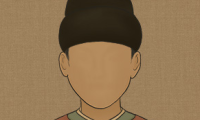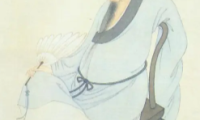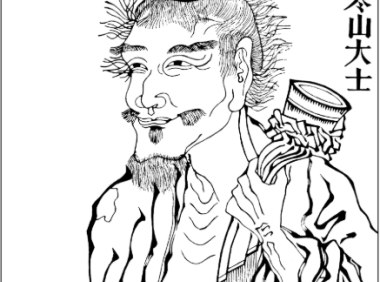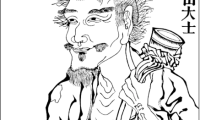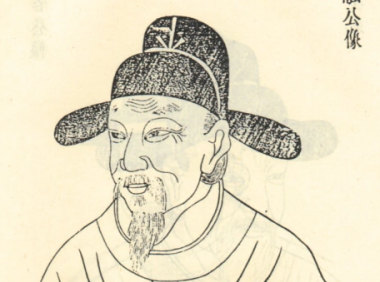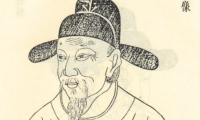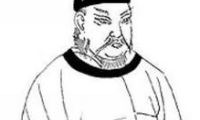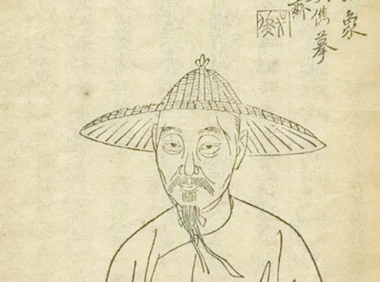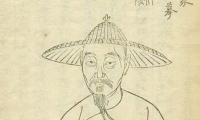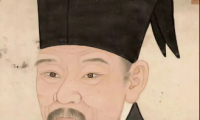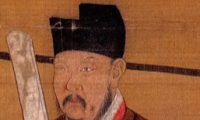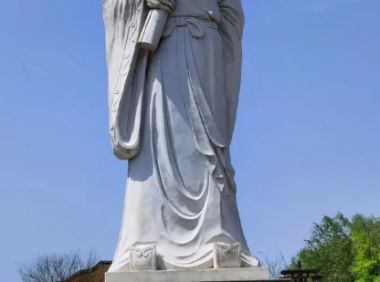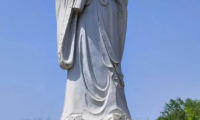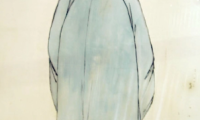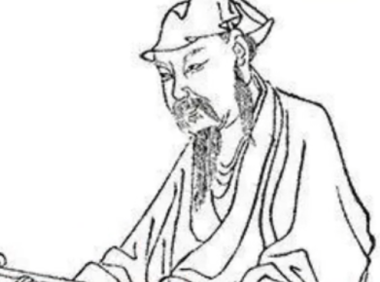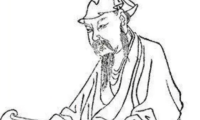-
Wei Yong: Thoughts at Leisure on New Year’s Day
闲赏·元旦 卫泳 元旦应酬作苦,且阅岁渐深,韶光渐短,添得一番甲子,增得一番感慨。庄子曰:大块“劳我以生”。此之谓乎!吾所取者,淑气临门,和风拂面,东郊农事,举趾有期。江梅提柳,装点春工,晴雪条风,消融腊气,山居之士,负暄而坐,顿觉化日舒长,为人生一快耳。 Thoughts at Leisure on New Year’s Day Wei Yong It is actually a grind to attend a lot of trivial social activities during the New Year’s Day.1 Besides, good days will look increasingly shorter as we grow older. Therefore, once we are one more year older, we will have the regret that our future days are one year shorter. Zhuangzi’s words that “Nature makes me grow with toil”2 must refer to this situation. Therefore, the attitude I should adopt is that when spring is coming and an agreeable breeze is caressing my face, it is time that I should get ready to do the farm work in the eastern suburbs. The plum blossoms along the riversides and the willows on the causeways decorate the beautiful scenery in spring. The east wind blows away the lingering snow on sunny days, dispelling the piercing cold air in the coldest 12th month of the lunar year. When the folks who dwell in the hills sit outside to bask their backs in the sun, they suddenly feel that the time of the day is now becoming longer. What a delightful thing in life it is! Here, New Year’s Day refers to Chinese Spring Festival,…...
- 0
- 0
- 47
-
Li Ye: A Song Written on the Topic “Streams Flowing down in the Three Gorges”
从萧叔子听弹琴,赋得三峡流泉歌 李冶 妾家本住巫山云,巫山流泉常自闻。 玉琴弹出转寥夐,直是当时梦里听。 三峡迢迢几千里,一时流入幽闺里。 巨石崩崖指下生,飞泉走浪弦中起。 初疑愤怒含雷风,又似呜咽流不通。 回湍曲濑势将尽,时复滴沥平沙中。 忆昔阮公为此曲,能令仲容听不足。 一弹既罢复一弹,愿作流泉镇相续。 A Song Written on the Topic “Streams Flowing down in the Three Gorges” Li Ye My home used to be up there in Wu Mountain’s clouds, Where streams flowing from the mountain always can be heard. As the jade zither plays these sounds, they grow more sharp and clear, Just as they were in days of yore when heard within a dream. The Three Gorges are far away, many thousands of miles, But all at once they come flowing into my secluded chambers. Huge boulders crash down cliffs, audible under his fingers, Waterfalls and rushing waves rise from in the strings. It seems at first some bursting rage, thundering gales within, Then as if choked with sobbing sounds some current can’t get through. When force of winding rapids and whirlpools runs its course, The liquid notes fall drop by drop upon the level sand. I recall how long ago Ruan Xian composed this tune This could make even him ever hear his fill. You’ve played it once and finished, now play it once again, I want those flowing streams to continue forever. (Stephen Owen 译)...
- 0
- 0
- 45
-
Li Ye: Reproach in Love
相思怨 李冶 人道海水深,不抵相思半。 海水尚有涯,相思渺无畔。 携琴上高楼,楼虚月华满。 弹著相思曲,弦肠一时断。 Reproach in Love Li Ye People say the sea is deep it’s not as deep by half as love. The sea at least still has its coasts, love’s farthest reaches have no shore. Take your harp and climb the tower, where moonlight fills the empty rooms. Then play the song of longing love heart and strings will break together. (Stephen Owen 译) The Bitterness of Longing Li Ye Deep is the ocean of human life, but the ocean has a shore; twice as deep is my longing for you, and longing is ever more. Lute in hand, I go upstairs, but there is no one here; moonlight fills the empty room, shining from way out there. Plucking my lute, I play a tune, Song of Pining for You; a string snaps as it rends my heart, breaking it in two. (Bannie Chow and Thomas Cleary 译)...
- 0
- 0
- 62
-
Li Ye: Eight Superlatives
八至 李冶 至近至远东西,至深至浅清溪。 至高至明日月,至亲至疏夫妻。 Eight Extremes Li Ye What is closest and farthest apart? east and west, What is deepest and most shallow? the clear brook. What is highest and brightest? the sun and moon, Most intimate and most estranged? a man and wife. (Stephen Owen 译) Eight Superlatives Li Ye Furthest and nearest are east and west; deepest and most shallow are pure clear valley streams. Highest and brightest are the sun and moon; closest and most distant are husband and wife. (Bannie Chow and Thomas Cleary 译)...
- 0
- 0
- 71
-
Luo Yin: Snow
雪 罗隐 尽道丰年瑞,丰年事若何? 长安有贫者,为瑞不宜多。 Snow Luo Yin A bumper snow, a bumper harvest; It is universally said. But Some people are ill-fed and ill-clad In the capital, and they are cold. (张智中 译)...
- 0
- 0
- 62
-
Whipping the Ox in Spring
立春候,府县官吏具公服,礼勾芒,各以彩杖鞭牛者三,劝耕也。 (明)刘侗、于奕正《帝京景物略》 立春日,太守集府堂,鞭牛碎之,谓之打春。农民竟以麻麦米豆抛打春牛。……百姓买芒神、春牛亭子,置堂中,云宜田事。 (清)顾禄《清嘉录》 Whipping the Ox in Spring On the first days of the beginning of Spring, officials at the prefecture and the county levels all dress up to worship the god of farming. Afterwards, they whip the ox with decorative rods and sticks, a symbolic gesture to urge tillage. Liu Tong& Yu Yizheng (Ming Dynasty): Scenery and Events in the Capital On the day of the beginning of Spring, officials gather in town halls and shatter a clay ox by whipping it. This practice is called “beating the spring”. Farmers vie in sprinkling clay oxen with sesame, barley, rice and bean. Common people buy portraits of the god of farming, and bring clay oxen usually intended for their courtyards into their living rooms because they believe that doing so will be beneficial to husbandry. Gu Lu (Qing Dynasty): Worthy Records of the Qing Dynasty (姚红 译)...
- 0
- 0
- 77
-
Papercuttings to Welcome Spring
剪纸迎春 立春之日,悉剪彩为燕以戴之,帖“宜春”二字。 (南朝 梁)宗懔《荆楚岁时记》 立春之日,士大夫家剪纸为小幅,或悬于佳人之首,或缀于花下。 (唐)段成式《酉阳杂俎》 Papercuttings1 to Welcome Spring On the first day of Spring people cut patterns of swallows out of colourful silk to be worn on the hair and put characters which mean “pleasant spring” on their doors. Zong Lin (Southern Dynasties, the State of Liang): Stories of the Jing and Chu Times On the first day of Spring2, the families of officials and scholars cut small pieces of paper [into patterns of birds and flowers], some to be worn on the hair of the beauties, some to be attached to flowers and plants. Duan Chengshi (Tang Dynasty): You Yang Records of a Myriad Things Papercuttings: sometimes also called floral window decorations, the making of which dates far back to the Western Jin Dynasty (around the 3rdcentury). At that time, people cut swallow patterns out of colourful silk or paper to celebrate spring. This practice, originally a method of praying for luck, later became popular in all parts of China. Now paper-cutting, is a common, traditional folk art for decorative purpose. the first day of Spring: one of the 24 solar terms, or divisions of the solar year according to the Chinese calendar. The Chinese take this day as…...
- 0
- 0
- 61
-
Jiang Kui: Crickets
齐天乐·咏蟋蟀 姜夔 庚郎先自吟《愁赋》,凄凄更闻私语。露湿铜铺,苔侵石井,都是曾听伊处。哀音似诉,正思妇无眠,起寻机杼。曲曲屏山,夜凉独自甚情绪? 西窗又吹暗雨,为谁频断续,相和砧杵?候馆迎秋,离宫吊月,别有伤心无数。豳诗漫与,笑篱落呼灯,世间儿女。写入琴丝,一声声更苦。 Crickets Jiang Kui At first Mr. Zhang chanted a wonderful poetic prose, Like the famous poet Yu Xin used to sing his Rhapsody of Sorrows. Then I heard crickets chirp plaintively from the hollows, From the bronze door ring bases, And from the stone wells covered with mosses. Hearing this querulous sound of crickets, The longing woman in her private room, Unable to sleep, got up to look for the loom. Looking at the winding mountains on the screen, She thought of her husband travelling. What was her emotion in such a lonely cold evening? I seemed to hear wailing wind And weeping rain patter on the west window. For whom the sound of the rain and wind now stopped, now continued, And was accompanied with the clothes-beating sound? Travellers feeling sad in the autumn at a forlorn inn, And concubines in a temporary palace falling into disfavor with the king, Would be all the more heart-broken When they heard the plaintive sound of crickets in a cold moonlit evening. In the Book of Songs a poet wrote an impromptu poem on crickets with deep feeling. Children knowing nothing of the sadness of the world Try to catch crickets…...
- 0
- 0
- 52
-
Cliffs, Sun, and a Daylight Moon Arise – Poems by Han-shan
鹦鹉宅西国 [唐代] 寒山 鹦鹉宅西国,虞罗捕得归。 美人朝夕弄,出入在庭帏。 赐以金笼贮,扃哉损羽衣。 不如鸿与鹤,飖飏入云飞。 Cliffs, Sun, and a Daylight Moon Arise The word goes forth, and a woodsmen Cast their nets for feathers, red, green and blue. For what? For beauties, immured by painted screens, To pass their hours aimlessly. Though their cages shimmer, sunlit gold, Their plumage fades their eyes, shaded. No longer scan the flock of wild swans, White and soaring into the racing clouds. (Peter Stambler 译) Parrots live in western lands hunters bring them back in nets courtesans tease them dawn to dusk somewhere behind palace curtains they’re given a golden cage but locked away their plumage fades not like wild geese and swans flying up in the clouds (Red Pine 译) The parrot’s home is the Western land, But with forester’s snare it can be caught and brought here. The beautiful women will play with it night and day; In and out it will go, amid their rooms’ screens. As a gift, a gold cage to store it away; Locked in! It will lose its feathered clothes1. Much better to be a goose or a crane, Soaring and drifting up in the clouds. Yü-i(“feathered clothes”) are things the immortals wear. It comes to mean…...
- 0
- 0
- 47
-
Wang Ch’ing-hui: P’u – Man Chiang Hung
满江红·题南京夷山驿 宋·王清惠 太液芙蓉,浑不似、旧时颜色。曾记得、春风雨露,玉楼金阙。名播兰馨妃后里,晕潮莲脸君王侧。忽一声、鼙鼓揭天来,繁华歇。 龙虎散,风云灭。千古恨,凭谁说?对山河百二,泪盈襟血。驿馆夜惊尘土梦,宫车晓辗关山月。问姮娥、于我肯从容,同圆缺。 P’u – Man Chiang Hung (To the tune-title ‘Sunset on the River’) Journey into Captivity Wang Ch’ing-hui Mimosa at T’ai-yeh Cannot have the same Colour as in those days of old Remembered from a past Of spring-time dew and wind and rain In the Jade Tower and Palace of Gold. My name among the royal ladies spread like orchid-scent; A blushing, bashful lotus-flower the Sovereign’s grace befriended. When suddenly a clamour Of war-drums fit to startle heaven burst. The gay life ended. Dragon and Tiger fled, Cloud and Wind were gone.To share such depth of sorrow Whom could I count upon? Faced with the sight of all those rivers and mountains Blood stained my dress, and tears fell so. Each night at road-side inns I woke in terror from dreams of travel; Each dawn the palace carriages rolled through passes lit by the moon. I begged Ch’ang-O In kindness to allow me to go with her Wherever she might go. (Alan Ayling and Duncan Mackintosh 译)...
- 0
- 0
- 50
-
Yue Wei Cao Tang Notes
高冠瀛言,有人宅后空屋住一狐,不见其形,而能对面与人语。其家小康,或以为狐所助也。有信其说者,因此人以求交于狐,狐亦与款洽。一日,欲设筵飨狐,狐言老而饕餮,乃多设酒肴以待。比至日暮,有数狐醉倒现形,始知其呼朋引类来也,如是数四,疲于供给,衣物典质一空,乃微露求助意。狐大笑曰:“吾惟无钱供酒食,故数就君也,使我多财,我当自醉自饱,何所取而与君友乎?”从此遂绝。此狐可谓无赖矣,然余谓非狐之过也。 Gao Guanying told me that a fox-spirit lived in an empty room behind someone’s house, keeping out of sight but able to talk with people. That household was well-off, and word spread that the fox had something to do with this. A man who believed this persuaded the owner of the house to introduce him to the fox-spirit, who agreed to chat with hi. One day this man invited the fox to a feast. As the fox said he was old and gluttonous, he prepared plenty of food and drink to entertain him. That evening, when several foxes got drunk and revealed their forms, he realized that the fox had brought some of his friends. After giving such feasts several times, the man had run out of money and was forced to pawn all his clothes and property. So he hinted that he needed help. The fox-spirit laughed and said, “It was only because I had no money to buy food and wine that I came to you time and again. If I had plenty of money, I should feed myself and get drunk by myself. Why should I befriend you?” (杨宪益 译)...
- 0
- 0
- 50
-
Liu Tong & Yu Yizheng (Ming Dynasty): Scenery and Events in the Capital
帝京景物略 三月清明日,男女扫墓,担提尊榼,轿马后挂楮锭,粲粲然满道也。拜者、酹者、哭者、为墓除草填土者,焚楮锭次,以纸钱置坟头……哭罢,不归也,趋芳草,择园圃,列坐尽醉。有歌者苦笑无端,哀往而乐回也。是日簪柳,游高粱桥,曰踏青,多四方客未归者,祭扫日感念出游。 明/刘侗、于奕正 《帝京景物略》 The Clear Brightness Festival1 On a day in the third month of the lunar year (usually April 5 by the solar calendar), people sweep their ancestral tombs. They bring wine and food in baskets or on bamboo poles resting on their shoulders. Some travel on sedan-chairs or in carriages aglitter with strings of paper ingots2, on roads crowded with people. They kowtow and pour libations at the tombs. Then they weed and add fresh soil to the tombs. Afterwards, they burn the strings of paper ingots and place coin-shaped pieces of paper on top of the graves as an offering to the dead. After weeping, instead of leaving, they find a pleasant place with trees and flowers to sit down and drink to their hearts’ content. Some sing, laugh or cry for no reason. Though they go out sad, they return happy. On this day, people wear willows in their hair and visit the Sorghum Bridge3. This custom is called “walking on the green”4. From far and near, many come and do not think of going home early because they make this excuse to enjoy an outing. Liu Tong & Yu Yizheng (Ming Dynasty): Scenery and Events in…...
- 0
- 0
- 61
-
Qiao Ji: Roaming on Mourning Day
折桂令 客窗清明 乔吉 风风雨雨梨花, 窄索帘栊, 巧小窗纱。 甚情绪灯前, 客怀枕畔, 心事天涯。 三千丈清愁鬓发, 五十年春梦繁华。 蓦见人家, 杨柳分烟, 扶上檐牙。 Roaming on Mourning Day Qiao Ji Pear blossoms fade in wind and rain. On narrow window frame I lean By delicate window screen. In what mood before lamplight can I remain? A roamer whose head on the pillow lies, And whose heart to the end of the earth flies. My grief as long as an old man’s hair white, Fifty years have passed like a vernal dream overnight. Suddenly a house comes to sight, Where smokelike willow leaves Adorn the tilting eaves. (许渊冲 译) Thoughts by the Window of the Hostel at Qingming Festival to the tune of Plucking Cassia Qiao Ji Pear blossoms in the wind and rain flying Past the curtains with ropes fine, Over the veiled window of a delicate little pattern, How I feel wretched sitting alone before the lantern, Or head on pillow with traveller’s thoughts and grief strong, Going far, far away to the end of the earth. My melancholy and white hair are three thousand feet long, Fifty years being past in a spring dream of prosperity and mirth. Suddenly I see a thatched house, Shaded by smoky willows so large…...
- 0
- 0
- 47
-
Ji Yun: Selections from “Notes of Yuewei Hermitage”
《阅微草堂笔记》节选 纪昀 曹司农竹虚言:其族兄自歙往扬州,途经友人家。时盛夏,延坐书屋,甚轩爽。暮欲下榻其中,友人曰:“是有魅,夜不可居。”曹强居之。 夜半,有物自门隙蠕蠕入,薄如夹纸。入室后,开展作人形,乃女子也。曹殊不畏。忽披发吐舌作缢鬼状。曹笑曰:“犹是发,但稍乱;犹是舌,但稍长,亦何足畏?”忽自摘其首置案上。曹又笑曰:“有首尚不足畏,况无首耶!”鬼技穷,倏然灭。 及归途,再宿。夜半,门隙又蠕动。甫露其首,辄唾曰:“又此败兴物耶?”竟不入。 《滦阳消夏录》 Selections from “Notes of Yuewei Hermitage” Ji Yun Cao Zhuxu the Minister of Agriculture told me that once, on his way from Shexian to Yangzhou, a cousin of his broke his journey to visit a friend. It was the midsummer. The friend invited him to sit in his study, which was roomy and cool. That evening he wanted to sleep there, but his friend said, “There is a ghost, so no one can stay here at night.” Still his cousin insisted on staying there. At midnight something as thin as folded paper crept in through a chink in the door; but once in the room it spread out and took the form of a woman. Cao was not afraid. When the apparition let down is hair and struck out its tongue like a woman who had hanged herself, he said with a laugh, “Your hair is rather tousled and your tongue is rather long, but why should that scare me?” Then the ghost took off its head and placed it on the desk. With another laugh Cao said, “Even with a head you can’t scare me, much less without one.” Having run out of…...
- 0
- 0
- 66
-
Wu Rong: Poplar Flower
Wu Rong 杨花 吴融 不斗秾华不占红,自飞晴野雪蒙蒙。 百花长恨风吹落,唯有杨花独爱风。 Poplar Flower Wu Rong Vying not for garish tinct nor tinge of rubicund glow, They dance over the field on sunny days like misty snow. Diverse blossoms invariably complain of gusty blow, With ardent love for wind the hearts of poplar flowers alone overflow. (黄龙 译)...
- 0
- 0
- 69
-
Wei Zhuang: Thousands of Knots at Heart
应天长 韦庄 别来岁半音书绝, 一寸离肠千万结。 难相见,易相别, 又是玉楼花似雪。 暗相思,无处说, 惆怅夜来烟月。 想得此时情切, 泪沾红袖黦。 Thousands of Knots at Heart To the Tune of Yingtianchang Wei Zhuang No letter has come from you for half a year: one inch of separation grief, thousands of knots in the heart. It’s easy to part, but not easy to meet. Again, the jade abode is covered in the willow catkins like snow. There’s no describing how I miss you. Melancholy comes with the mist and the moon in the evening. Overwhelmed at the thought of you, I raise my red sleeves soaked in tears. (裘小龙 译)...
- 0
- 0
- 77
-
Wei Zhuang: Tune: “Pu Sa Man” Dreaming in Autumn
菩萨蛮 韦庄 红楼别夜堪惆怅, 香灯半卷流苏帐。 残月出门时, 美人和泪辞。 琵琶金翠羽, 弦上黄莺语。 劝我早归家, 绿窗人似花。 Tune: “Pu Sa Man” Dreaming in Autumn Wei Zhuang How can one not be sad in a red chamber on parting night? The tasseled canopy was half closed in scented lamplight. The waning moon was still hanging when I left home. With tears in her eyes, she said good-bye. She played the pipa decorated with a golden-green feather. She plucked the strings in oriole language for me to decipher. She advised me to return home soon. For the person by the green window would be like a flower in bloom. (Edward C. Chang 译) Pu’ Sa Man (To the Tune-title ‘The Strange Goddesses’) Wei Zhuang North and South I Parting at night in the upper room what preys to grief we were – Lamp-lit fragrance and those half-rolled tasseled curtains there. The moon was waning as I left the house; Your beauty shone in every farewell tear. Your gilt guitar, king-fisher blue inlaid, Its strings a golden-oriole’s serenade, Urged me to come back soon, to come back soon To the green-gauze window veiling a flower-fresh maid. (Duncan Mackintosh, Ch’eng His and T’ung Ping-Cheng 译)...
- 0
- 0
- 59
-
Huang Jingren: Parting from My Old Mother
别老母 黄景仁 搴帷拜母河梁去,白发愁看泪眼枯。 惨惨柴门风雪夜,此时有子不如无。 Parting from My Old Mother Huang Jingren I leave my mother at the door for riverside, I gaze at her white hair and tearful eyes now dried. To have on snowy night a son not within call, It is no better than to have no son at all. (许渊冲 译)...
- 0
- 0
- 51
-
Su Zhe: The Mid-Autumn Night
中秋夜八绝 苏辙 长空开积雨,清夜流明月。 看尽上楼人,油然就西没。 The Mid-Autumn Night Su Zhe After rain the sky is vast and clear, And the bright moon sails at night. The watchers go to sleep one by one; Seeing this, she gladly shuts her light. (陈君朴 译)...
- 0
- 0
- 57
-
Yan Shu: The Moon at the Mid-Autumn Night
中秋月 晏殊 十轮霜影转庭梧,此夕羁人独向隅。 未必素娥无怅恨,玉蟾清冷桂花孤。 The Moon at the Mid-Autumn Night Yan Shu The pale moon shadow moves past the yard’s phoenix tree, On this night the sojourner alone is sad as sad could be; The Moon Goddess Chang-e must have the same feeling: She has only toad and osmanthus to keep her company. (陈君朴 译)...
- 0
- 0
- 63
-
Li He: The Tomb of Little Su
Li He 苏小小墓 李贺 幽兰露, 如啼眼。 无物结同心, 烟花不堪剪。 草如茵, 松如盖。 风为裳, 水为珮。 油壁车, 夕相待。 冷翠烛, 劳光彩。 西陵下, 风吹雨。 The Tomb of Little Su Li He Dew on the hidden orchid is like an eye with tears. Nothing that ties a true-love-knot, flowers in mist, can’t bear to cut. The grass like the riding cushion, the pines like the carriage roof. The wind is her skirt, the waters her pendants. The coach with polished sides awaits in the twilight. Cold azure candlelight struggling to shine. Beneath Western Mound wind blows the rain. (Stephen Owen 译) The Grave of Little Su Li Ho Dew on the secret orchid Like crying eyes. No thing to bind the heart to. Misted flowers I cannot bear to cut. Grass like a cushion, The pine like a parasol: The wind is a skirt, The waters are tinkling pendants. A coach with lacquered sides Waits for someone in the evening. Cold blue candle-flames Strain to shine bright. Beneath West Mound The wind puffs the rain. (A.C. Graham 译) A Lady’s Sepulcher Li Ho Dew drops of shaded orchids Gaze as the eyes weep; They shall never be true lovers; The dancing girl will never enter her lover’s home. The…...
- 0
- 0
- 87
-
Cheng Panchiao: Fourth Letter to Brother Mo from Weihsien
潍县寄舍弟墨第四书 郑燮 凡人读书,原拿不定发达。然即不发达,要不可以不读书,主意便拿定也。科名不来,学问在我,原不是折本的买卖。愚兄而今已发达矣,人亦共称愚兄为善读书矣,究竟自问胸中担得出几卷书来?不过挪移借贷,改窜添补,便尔钓名欺世。人有负于书耳,书亦何负于人哉! 昔有人问沈近思侍郎,如何是救贫的良法?沈曰:读书。其人以为迂阔。其实不迂阔也。东投西窜,费时失业,徒丧其品,而卒归于无济,何如优游书史中,不求获而得力在眉睫间乎!信此言,则富贵,不信,则贫贱,亦在人之有识与有决并有忍耳。 Fourth Letter to Brother Mo from Weihsien From Family Letters of a Chinese Poet Cheng Panchiao When a man goes to school, he cannot be certain that he will become an official. But whether he becomes an official or not, he should not forget the true object of study. If one fails in the examinations, the knowledge gained still remains his own and it should not be regarded as a losing investment. I, for instance, have become successful and am reputed to have a good knowledge of books. But when I ask myself, I cannot say how many books I have really absorbed into my heart. All we do usually is to borrow from one book and adapt from others, thus gaining a reputation by cheating. The scholars owe a debt to the books, while the books owe nothing to them. Formerly someone asked Shen Chinsze what to do to avoid poverty, and his reply was to read books. The man thought Shen’s advice was impractical, but it is practical. A man loses his character by rushing about and attending to worthless affairs and in the end gains nothing. It would be better for him to wander…...
- 0
- 0
- 67
-
Wei Zhuang: Thousands of Knots at Heart
应天长 韦庄 别来岁半音书绝, 一寸离肠千万结。 难相见,易相别, 又是玉楼花似雪。 暗相思,无处说, 惆怅夜来烟月。 想得此时情切, 泪沾红袖黦。 Thousands of Knots at Heart To the Tune of Yingtianchang Wei Zhuang No letter has come from you for half a year: one inch of separation grief, thousands of knots in the heart. It’s easy to part, but not easy to meet. Again, the jade abode is covered in the willow catkins like snow. There’s no describing how I miss you. Melancholy comes with the mist and the moon in the evening. Overwhelmed at the thought of you, I raise my red sleeves soaked in tears. (裘小龙 译)...
- 0
- 0
- 59
-
Shao Hengzhen: Early Summer of the Zhenxi Stream
贞溪初夏 邵亨贞 楝花风起漾微波,野渡舟轻客自过。 沙上儿童临水立,戏将萍叶饲黄鹅。 Early Summer of the Zhenxi Stream Shao Hengzhen Chinaberry trees begin to flower in wind that ripples the stream; At the ferry a traveler himself has to do the ferrying. On the beach a playful kid stands by the waters, Feeding young geese with leaves of duck weed. (王晋熙、文殊 译)...
- 0
- 0
- 59














